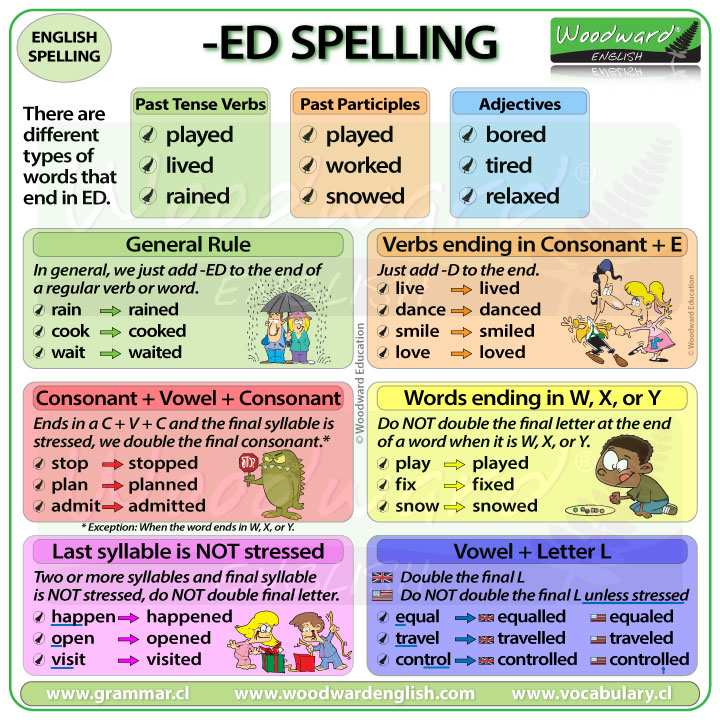In English there are many words that end in ED. There are:
Regular past simple tense verbs:
- I played my guitar last night.
- We lived there for two years.
- It rained yesterday.
Regular past participles (which have the same form as the past simple tense form):
- I have played this game before.
- I have worked here for many years.
- It has snowed a lot this month.
And Adjectives ending in ED
- He is bored.
- I was embarrassed.
- They are relaxed.
In this English lesson, we are going to learn the correct spelling of words ending in ED.
For now we will mostly use regular verbs in the past tense as examples though the same rules apply to all words ending in ED.
General Spelling Rule
In general, you just add -ED to the end of a regular verb or word.
For example: with the verb play, just add ED to the end and it becomes played.
| Infinitive | ED form |
| to play | played |
| to rain | rained |
| to fix | fixed |
| to wait | waited |
| to look | looked |
- I played football last weekend.
- It rained last night.
- He fixed his bike yesterday.
- We waited for two hours and then left.
- She looked out the window.
BUT there are some exceptions!
-ED Spelling Exceptions
Verbs ending in Consonant + E
When a word ends in a consonant + E, we just add D to the end of it.
For example: LIVE ends in the consonant V followed by the letter E.
What do we do? We just add the letter D to the end. So now it is written as LIVED.
| Infinitive | ED form |
| to live | lived |
| to dance | danced |
| to smile | smile |
| to love | loved |
- We lived in Italy for three years.
- They danced all night.
- she smiled at me.
- I loved the surprise.
Verbs ending in consonant + vowel + consonant
When a verb ends in a consonant + vowel + consonant AND the final (or only) syllable is stressed, we double (make two of) the final consonant and add ED. This includes words that only have one syllable.
STOP is a verb that has one syllable.
STOP ends in a consonant T, a vowel O, and a consonant P.
What do we do? We double the final consonant P which now gives us two Ps.
Then we can add the -ED.
So now STOP becomes STOPPED with two Ps in the middle.
| Infinitive | ED form |
| to stop | stopped |
| to plan | planned |
| to admit | admitted |
| to refer | referred |
| to submit | submitted |
Let’s see some examples of words ending in a consonant + vowel + consonant: stop, plan, admit and refer
We double the final consonant and add -ED to the end of them.
We double the final consonant N of PLAN and it becomes PLANNED with two Ns.
ADMIT has two syllables though the last syllable is stressed … adMIT.
So, we double the final consonant T of ADMIT and it becomes ADMITTED with two Ts.
REFER has two syllables though the last syllable is stressed … reFER.
So, we double the final consonant R of REFER and it becomes REFERRED with two Rs.
- He stopped at the traffic light.
- We planned a surprise party for him.
- He admitted that he had lied.
- The teacher referred her students to the Woodward English website.
- He submitted another proposal.
There is an exception to this rule. We don’t double the final consonant when it is W, X or Y.
Words ending in W or X or Y
When a word ends in a W, X or Y, we do NOT double that final letter before add ED. Notice how there is a vowel before each letter.
For example: the verb PLAY is a verb that ends a consonant L a vowel A and a consonant Y. But since the final consonant is a Y, we do NOT double that letter.
What do we do? We just add ED to the end.
So PLAY becomes PLAYED. We do not write two Ys.
| Infinitive | ED form |
| to play | played |
| to fix | fixed |
| to follow | followed |
| to enjoy | enjoyed |
| to relax | relaxed |
| to snow | snowed |
- We played at the park this morning.
- The mechanic fixed our car.
- The dog followed me home.
- She enjoyed the massage because it relaxed her.
- It snowed yesterday.
These words end in a consonant, a vowel and a consonant, BUT they also end in W, X, or Y so we do not double the final letter.
Last syllable NOT stressed
When a word has two or more syllables and the last syllable is NOT stressed, we do NOT double the final letter before adding ED.
The verb OPEN has two syllables…. O + PEN.
Since the first syllable is stressed (O-pen) and not the last syllable (we do not say o-PEN), we do not double the final N.
So we just add ED to the end and it now becomes OPENED.
Here are some more examples: Happen, listen, offer, open, visit, whisper
Notice how the FIRST syllable of each word is stressed:
Happen, listen, offer, open, visit, whisper
| Infinitive | ED form |
| to happen | happened |
| to listen | listened |
| to offer | offered |
| to open | opened |
| to visit | visited |
| to whisper | whispered |
- What happened to you?
- I listened to the radio on the way to work.
- My boss offered me a new position.
- I opened my birthday presents.
- They visited the museum.
- They whispered because the baby was asleep.
EXCEPTION:
The verb kidnap is an exception to this rule. The first syllable has the stress (KID-nap) but for this word we do double the final P.
- Kidnap -> kidnapped
Verbs ending in a vowel + L
There are two ways of spelling a verb ending in a consonant + vowel + L.
In BRITISH English, you double the final L.
In AMERICAN English, you do NOT double the final L unless it is stressed.
For example: the verb TRAVEL is a verb that ends a consonant V… a vowel E… and the consonant L.
Which syllable is stressed when I say travel?
Yes the first syllable is stressed, the T-R-A …. TRAvel.
The last syllable with VEL at the end is NOT stressed.
So what do we do?
Traveled or Travelled?
There are two ways of spelling this word.
In British English we double the final L, so now there are two Ls, and then we add ED. In British English this becomes TRAVELLED with TWO Ls.
In American English just add ED because the final consonant with L is NOT stressed. In American English this becomes TRAVELED with ONE L.
The first syllable of the verb travel is stressed (TRA-vel)
The first syllable of the verb equal is stressed (E-qual)
The last syllable of the verb control is stressed (con-TROL)
| Infinitive | ED form (British English) |
ED form (American English) |
| to travel | travelled | traveled |
| to equal | equalled | equaled |
| to control | controlled | controlled * |
* Notice how there is a double L in controlled in American English. That is because the last syllable of the verb control is stressed (con-TROL)
- British English: We travelled around Europe last month.
- American English: We traveled around Europe last month.
- British English: Sales have equalled last year’s figures.
- American English: Sales have equaled last year’s figures.
- British English: They controlled everything we did.
- American English: They controlled everything we did.
ED Spelling Chart

Next Activities
You may be interested in our lesson about the pronunciation of words ending in ED.
